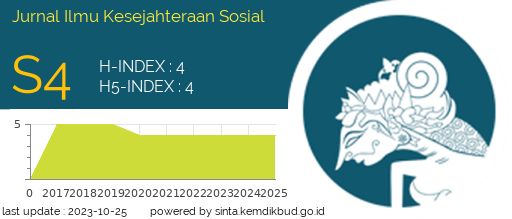DOI
10.7454/jurnalkessos.v25i2.1053
Abstract
Water is a non-economic good that undoubtedly plays an important role in improving people's well-being. Global data shows that the agricultural sector is the most water- consuming base of life, especially for local communities that rely on agriculture. Increasing food production in the future along with population growth will potentially demand sustainable water resource management. Water regulation plays an important role in determining the allocation, distribution and use of water resources. Lack of availability and access to water creates mutual vulnerability among environmental and social ecosystems. The legitimacy crisis of water governance is a major issue faced by lower-level bureaucracies (Turley, 2021). Previous studies attribute the functioning of democracy at the local level to contribute to water governance (Fawcett and Marsh, 2013; Harmes, 2021). However, social policies on water have not been considered as part of basic services from the main focus of classical traditional policies. This article discusses the importance of social policies for water that illustrate the relationship between people's well-being and water availability and the challenges faced at the local community level. Adequate water management contributes to an indicator of well-being. The implementation of social policy on water distribution is a complex issue and raises fundamental questions related to availability and accessibility.
References
Miller, J. D., Vonk, J., Staddon, C., & Young, S. L. (2020). Is household water insecurity a link between water governance and well-being? A multi- site analysis. Journal of Water, Sanitation and Hygiene for Development, 10(2), 207-219. https://doi.org/10.2166/washdev.2020.0 33. Foo, K., Martin, D., Polsky, C., Wool, C., & Ziemer, M. (2014). Social well-being and environmental governance in urban neighbourhoods in Boston, MA. The Geographical Journal. https://doi.org/10.1111/geoj.12108. Alcon, F., Zabala, J. A., Martínez-García, V., Albaladejo, J. A., López-Becerra, E. I., de-Miguel, M. D., & Martínez-Paz, J. M. (2022). The social wellbeing of irrigation water: A demand-side integrated valuation in a Mediterranean agroecosystem. Agricultural Water Management, 262, 107400.
https://doi.org/10.1016/j.agwat.2022.107400. Simanihuruk, M., Arafah, W., Rahmanita, M., & Hadi, P. (2024). The role of governance, social welfare, and community participation on sustainable tourism village: A case study in pioneering tourism village, Bogor Regency, Indonesia. International Journal of Research and Review, 20240650. https://doi.org/10.52403/ijrr.20240650. Eshiotse, E., Wilson, N. U., Bukie, B. F., Undelikwo, V. A., Abang, P. O., Odinka, G. E., Uyang, F. A., Ofem, N. O., Bisong, B. D., Jeremiah, A., & Okpa, J. T. (2023). Exploring factors affecting government delivery of social welfare services using a multi-method approach. Corporate Governance and Organizational Behavior Review, 7(2), 26–37. https://doi.org/10.22495/cgobrv7i2p3. Leder, S., Upadhyaya, R., van der Geest, K., Adhikari, Y., & Büttner, M. (2024). Rural out-migration and water governance: Gender and social relations mediate and sustain irrigation systems in Nepal. World Development, 106544. https://doi.org/10.1016/j.worlddev.2024 .106544. Raymundo, R. B. (2015, March 2-4). Challenges to water resource management: Ensuring adequate supply and better water quality for the present and future generations. Dipresentasikan pada the DLSU Research Congress
2015, De La Salle University, Manila, Philippines. Siddique, I. M. (2022). Sustainable water management in urban environments. Chemistry Research Journal, 7(4), 95- 101. Maria, R., & Lestiana, H. (2014). Pengaruh Penggunaan Lahan Terhadap Fungsi Konservasi Air Tanah Di Sub Das Cikapundung. Jurnal RISET Geologi Dan Pertambangan, 24(2), 77. https://doi.org/10.14203/risetgeotam20 14.v24.85 Gunawan, D. H. (2013). Perubahan Sosial di Pedesaan Bali. Harmes, R. (2021). Localism and the Design of Political Systems. In Localism and the Design of Political Systems. https://doi.org/10.4324/9780367810054 . Norken, I. N., Suputra, I. K., & Arsana, I. G. N. K. (2017). Institutional and Regulatory Roles in Maintaining Sustainability of Subak as a World Cultural Heritage in Bali. Asian Agri- History, 21(4), 245–254. Parkinson, J. (2007). Localism and Deliberative Democracy. The Good Society, 16(1), 23–29. https://doi.org/10.2307/20711247 Rifandini, R. (2022). Kebijakan Inovatif Tata Kelola Air Bersih Desa melalui Dinamika Tipologi Kelembagaan Innovative Policy of Village Clean Water Governance. 6, 83–94.
Bahasa Abstract
Air merupakan barang non-ekonomi yang tanpa diragukan memainkan peran penting dalam meningkatkan kesejahteraan masyarakat. Data global menunjukkan sektor pertanian menjadi basis kehidupan yang paling banyak mengonsumsi air, terutama bagi komuunitas lokal yang bertumpu pada pertanian. Meningkatnya produksi pangan dalam beberapa waktu ke depan seiring dengan pertambahan populasi berpotensi menuntut pengaturan sumber daya air yang berkelanjutan. Pengaturan air memainkan peran penting dalam menentukan alokasi, distribusi, dan penggunaan sumber daya air. Kurangnya ketersediaan dan akses terhadap air menimbulkan kerentanan mutual diantara ekosistem lingkungan dan sosial. Krisis legitimasi tata kelola air menjadi isu utama yang dihadapi oleh birokrasi level bawah (Turley, 2021). Studi sebelumnya mengaitkan keberfungsian demokrasi di tingkat lokal berkontribusi terhadap tata kelola air (Fawcett & Marsh, 2013; Harmes, 2021). Akan tetapi, kebijakan sosial tentang air belum dianggap sebagai bagian dari layanan dasar dari fokus utama kebijakan tradisional klasik. Artikel ini membahas pentingnya kebijakan sosial untuk air yang menggambarkan hubungan kesejahteraan masyarakat dengan ketersediaan air beserta tantangan yang dihadapi di tingkat komunitas lokal. Pengelolaan air yang memadai berkontribusi menjadi indikator hidup layak (well-being). Penerapan kebijakan sosial perihal distribusi air merupakan isu yang kompleks dan menimbulkan pertanyaan mendasar terkait ketersediaan dan aksesibilitas. Studi ini membahas dinamika pengelolaan air bersih di tiga desa di kawasan DAS Cikapundung Hulu, Jawa Barat dalam menghadapi tantangan delineasi wilayah dan keterbatasan kewenangan dalam isu pengelolaan air. Studi ini memberikan perhatian pada metode penelitian berpikir sistem lunak untuk memahami kompleksitas tata kelola air dan mengeksplorasi kontruksi kebijakan sosial untuk air. Temuan penelitian menyasar pada perumusan kebijakan sosial untuk air yang mencerminkan kontekstual komunitas lokal.
Recommended Citation
Rifandini, Rahmalia
(2024)
"Air untuk Semua: Tantangan Kebijakan Sosial pada Distribusi Air di Komunitas Lokal,"
Jurnal Ilmu Kesejahteraan Sosial: Vol. 25:
No.
2, Article 2.
DOI: 10.7454/jurnalkessos.v25i2.1053
Available at:
https://scholarhub.ui.ac.id/jiks/vol25/iss2/2
Included in
Community-Based Learning Commons, Community-Based Research Commons, Inequality and Stratification Commons, Nonprofit Studies Commons, Organization Development Commons, Social Justice Commons, Social Policy Commons, Social Welfare Commons, Social Work Commons




